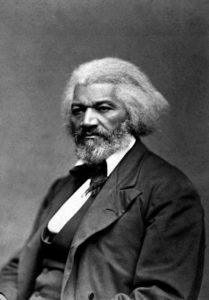
Marty Levine
July 5, 2023
I’ve come to increasingly believe that many of us, when confronted with a narrative that conflicts with our understanding of our history, or an alternative narrative that challenges our societal and personal status, find the pain of those moments too great to bear. Rather than confront the meaning of the conflict, we retreat into denial and self-protection. These feelings are strong, and the urge to deny and reject others seems to be fueling the heated rhetoric and politics of our age.
Martin Kaplan, a USC expert on media and society, told the LA Times a few years ago that “If democracy is America’s civic religion, then its sacred text is the Declaration of Independence.” Written by our nation’s “founding fathers”, the original text is enshrined in a place of honor in the National Archives in Washington DC, to be visited and venerated as all holy documents should be.
As young student I was taught to see one of its first lines, that “we hold these Truths to be self-evident, that all Men are created equal, that they are endowed by their Creator with certain unalienable Rights, that among these are Life, Liberty, and the Pursuit of Happiness…” as the core of our national ethos, what makes our nation special among all other nations.
A few days ago, I did something that I have not done in years, I read the Declaration in full. And like all sacred texts, I found it to be complicated, contradictory, and difficult to understand.
Yes, it does declare that all men are created equal. But I was surprised to see that it also says that we have a right to be independent because the King “ has excited domestic Insurrections amongst us, and has endeavoured to bring on the Inhabitants of our Frontiers, the merciless Indian Savages, whose known Rule of Warfare, is an undistinguished Destruction, of all Ages, Sexes and Conditions.” From this blatantly white dominant perspective those who lands the Founders were living on, whose lands they had taken by force were not to be counted as equals. At the very moment our “founding fathers” were declaring that all men were created equal, they were able to forget that some men were not, and they could be enslaved and that others were just savages and not equals.
I wonder if you are as surprised as I was that this sentence is part of this revered text. I was so surprised that I had to turn to my wife, working at her desk next to mine, and ask her if she recognized that sentence as part of the Declaration. She said no that she was as startled as I was.
I think of myself as well-educated and well-read, and I continue to find parts of shared history that I did not know. And, most embarrassedly, these often forgotten parts are those that question the nobility of our nation, the parts that have us acting brutally, and the parts which embrace the dominance of white, Christian western Europeans at the expense of others.
The contradictions in the Declaration are embedded in the political wars pervade our nation today, the contradictions that we continue to struggle to reconcile and are those we must go deeper into knowing and understanding. This distortion of our history should serve as a challenge for us to go deeper. Last week I came across these words from the Zohar, an ancient mystical text that seemed to speak to this moment: “The fools of the world look on nothing save the garment, which is the story of the Torah (the sacred text) and nothing more. They do not look at that which is under the garment.“ This is a push to be brave enough to look deeper, to find that part of the Declaration that we might not want to see, and grapple with the full breadth of our history and experience.
When look only at what is on the surface, we allow ourselves to accept the inequity of our nation as just a problem of human failure, a problem of each man, woman and child not doing as much as they can to improve the quality of their lives. We absolve ourselves of any reason to question our own advantages and our own privilege. We can look at a nation filled with human suffering and be comfortable that its not my fault and not my responsibility. We can rest easy and be comfortable.
In so many cases these days we seem to be struggling to push our national attention beyond the surface. When it launched 1619 Project, the New York Times asked us to take a deeper view of our national history. It asked us to reread another sacred text, The Constitution, and ponder on the just years after the Declaration declared that all men are equal we formed our government on the principal as spelled out in another sacred text, the Constitution, that “representatives and direct Taxes shall be apportioned…to their respective Numbers, which shall be determined by adding to the whole Number of free Persons, including those bound to Service for a Term of Years, and excluding Indians not taxed, three fifths of all other Persons.”
For the most part, we have chosen to sanctify a version of the history of our founding that ignores any narrative that might be painful or troubling or place our Founding Fathers and Mothers in less than heroic positions. We have admitted that not everything was perfect for everyone, but we have glossed over how that has played out in the lives of those who were slaves or indigenous peoples in these lands. And we continue to “edit” our troubled history to fit our needs history as Governor DeSantis did recently. But DeSantis went even further, claiming that “No one had questioned it [slavery] before we decided as Americans that we are endowed by our creator with unalienable rights and that we are all created equal…”

In 1852 Frederick Douglass was invited to be the main speaker at a Fourth of July celebration in Rochester, New York. His audience might have expected that he would focus on the glory of the Declaration, its claim of equality but he chose to focus on our other legacy, the one that, as a freed slave, he had experienced directly.
“I am not included within the pale of this glorious anniversary! Your high independence only reveals the immeasurable distance between us. The blessings in which you, this day, rejoice, are not enjoyed in common.-The rich inheritance of justice, liberty, prosperity and independence, bequeathed by your fathers, is shared by you, not by me. The sunlight that brought light and healing to you, has brought stripes and death to me. This Fourth July is yours, not mine. You may rejoice, I must mourn. To drag a man in fetters into the grand illuminated temple of liberty, and call upon him to join you in joyous anthems, were inhuman mockery and sacrilegious irony. Do you mean, citizens, to mock me, by asking me to speak today? If so, there is a parallel to your conduct. And let me warn you that it is dangerous to copy the example of a nation whose crimes, towering up to heaven, were thrown down by the breath of the Almighty, burying that nation in irrevocable ruin! I can today take up the plaintive lament of a peeled and woe-smitten people! Fellow citizens, above your national, tumultuous joy, I hear the mournful wail of millions! whose chains, heavy and grievous yesterday, are, to-day, rendered more intolerable by the jubilee shouts that reach them. If I do forget if I do not faithfully remember those bleeding children of sorrow this day, “may my right hand forget her cunning, and may my tongue cleave to the roof of my mouth!” To forget them, to pass lightly over their wrongs, and to chime in with the popular theme, would be treason most scandalous and shocking, and would make me a reproach before God and the world.”
The Declaration of Independence teaches us the risk of ignoring the pain of others, those who are marginalized and powerless. The English Monarchy refused to hear the pain that those living in North America were feeling; it refused to hear. “The History of the present King of Great Britain is a History of repeated Injuries and Usurpations, all having in direct Object the Establishment of an absolute Tyranny over these States… In every stage of these Oppressions we have Petitioned for Redress in the most humble Terms: Our repeated Petitions have been answered only by repeated Injury.” And, because the pains of the American settlers were ignored, we declared our independence and justified our fighting for our freedom.
Denying this pain will allow us to be more comfortable and less troubled. It will allow us to avoid having to consider what we have to do to redress the ills of the past. But it will not make that pain go away. Denying the pain and the ongoing impact of the ills of the past does not make those ills go away. It does not protect the impact of the past on the lives of today.
We have a choice. We can ignore the narratives of those who see history differently than the dominant story or we can look deeper and grapple with the reality that things are more complex and less comfortable than we may like. In its recent ruling on university affirmative action programs, the Supreme Court chose to go the path of ignoring the pains of those whose histories do not fall within the majority narrative of America as a nation of freedom and equality. In her dissent, Justice Jackson powerfully reminded us of why this is so harmful.
“With let-them-eat-cake obliviousness, today, the majority pulls the ripcord and announces “colorblindness for all” by legal fiat. But deeming race irrelevant in law does not make it so in life. And having so detached itself from this country’s actual past and present experiences, the Court has now been lured into interfering with the crucial work that UNC and other institutions of higher learning are doing to solve America’s real-world problems.
No one benefits from ignorance. Although formal race-linked legal barriers are gone, race still matters to the lived experiences of all Americans in innumerable ways, and today’s ruling makes things worse, not better. The best that can be said of the majority’s perspective is that it proceeds (ostrich-like) from the hope that preventing consideration of race will end racism. But if that is its motivation, the majority proceeds in vain. If the colleges of this country are required to ignore a thing that matters, it will not just go away. It will take longer for racism to leave us. And, ultimately, ignoring race just makes it matter more.
The only way out of this morass—for all of us—is to stare at racial disparity unblinkingly, and then do what evidence and experts tell us is required to level the playing field and march forward together, collectively striving to achieve true equality for all Americans.”
One does not have to agree to hear another’s story and recognize the pain they bring to present lives from their history. Finding ways to redress that pain may be difficult but without recognition and empathy, we face ongoing conflicts, festering wounds, and explosions of anger. When we retreat into our defensive shells we leave ourselves open to cynical parties who will use money and media to widen the chasms and fuel the denial.
We will all lose.
